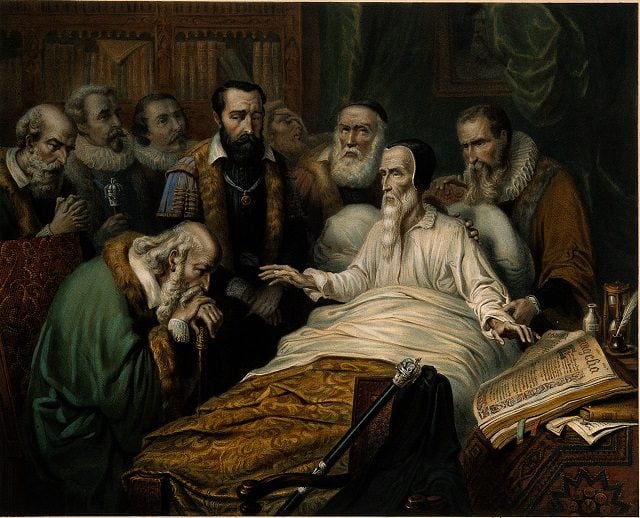
John Calvin on his deathbed, with members of the Church in attendance. Lithograph by W.L. Walton after Oakley, c.1865. This file comes from Wellcome Images, a website operated by Wellcome Trust, a global charitable foundation based in the United Kingdom. Refer to Wellcome blog post (archive). [Wikimedia Commons / Creative Commons Attribution 4.0 International license]
*****
Anti-Catholic reformed Protestant polemicist James Swan objected [on 8-22-17] to an alleged quotation of John Calvin: “Such monsters should be exterminated, as I have exterminated Michael Servetus the Spaniard.” It turns out that Dr. Jules Bonnet, editor of the standard collection of Calvin’s letters (I have two beautifully bound hardcover volumes from that in my own library), regards this particular letter and quotation as a forgery. Fair enough. Such things ought to be noted, and spurious quotations eliminated from any treatment of Calvin.
On the other hand, are the same sentiments expressed in the forgery, expressed elsewhere by John Calvin? The answer is a resounding yes. This is what James Swan misses (as so often). In his effort to repudiate a forged letter, he overlooks the issue that was addressed in the forged letter: Calvin’s particularly hostile attitude towards the heretic Michael Servetus, and his opinion that he himself took the lead in having him executed (even though, technically, the civil government had the jurisdiction and final say in such matters).
We know from letters, that Calvin expressed his wish that Servetus not be burned. He wanted him beheaded. Even so, he still expressed things virtually identical to the sentiment above, that has been determined to be a bogus quotation. Here is the evidence, from Calvin’s own words (Calvin’s words will be in blue, with my italicized emphases):
*****
Servetus lately wrote to me, and coupled with his letter a long volume of his delirious fancies, with the Thrasonic boast, that I should see something astonishing and unheard of. He offers to come hither, if it be agreeable to me. But I am unwilling to pledge my word for his safety, for if he shall come, I shall never permit him to depart alive, provided my authority be of any avail.
(Letter to Farel, 13 February 1546; in Henry Beveridge and Jules Bonnet, editors, David Constable, translator, Selected Works of John Calvin: Tracts and Letters: Volume 5: Letters, Part 2: 1545-1553; originally published in Philadelphia by Presbyterian Board of Publication, 1858; reprinted by Baker Book House, Grand Rapids, Michigan, 1983, p. 33; cited also in Philip Schaff, History of the Christian Church, Vol. VIII, ch. 16, section 136: “The Servetus Literature”)
Whoever shall now contend that it is unjust to put heretics and blasphemers to death will knowingly and willingly incur their very guilt. This is not laid down on human authority; it is God who speaks and prescribes a perpetual rule for his Church. . . . Many people have accused me of such ferocious cruelty that I would like to kill again the man that I have destroyed. Not only am I indifferent to their comments, but I rejoice in the fact that they spit in my face.
(Defense of Orthodox Faith against the Prodigious Errors of the Spaniard Michael Servetus, written in 1554; in Philip Schaff, History of the Reformation [New York, 1892], vol. 2, p. 791; cited in Stanford Rives, Did Calvin Murder Servetus?, Infinity, 2008, pp. 348-349)
Prominent Protestant Church historian Owen Chadwick, in his book, The Early Reformation on the Continent (Oxford University Press, 2001), makes note of this work (p. 388), and of Calvin’s asking for leave to write the tract, four days after Servetus’ execution.
But though the candour and justice which are natural to you, as well as the love you bear me, lead you to judge of me favourably, there are others who assail me harshly as a master in cruelty and atrocity, for attacking with my pen not only a dead man, but one who perished by my hands.
(Letter to Heinrich Bullinger, 29 April 1554 [CR XLIII, col. 123-4])
This letter was cited in The Life of John Calvin, by Thomas Henry Dyer (John Murray, 1850), on page 365. Encyclopædia Britannica (11th ed.), in its entry on Dyer, described this work as “an extremely detailed and on the whole impartial work and his influence in the religious world generally is insufficiently appreciated.”
Servetus . . . suffered the penalty due to his heresies, but was it by my will? Certainly his arrogance destroyed him not less than his impiety. And what crime was it of mine if our Council, at my exhortation, indeed, but in conformity with the opinion of several Churches, took vengeance on his execrable blasphemies? Let Baudouin abuse me as long as he will, provided that, by the judgment of Melanchthon, posterity owes me a debt of gratitude for having purged the Church of so pernicious a monster.
(in Philip Schaff, History of the Christian Church, Vol. VIII, ch. 16, section 136: “The Servetus Literature,” reply to Baudouin, 1562; Responsio ad Balduini Convicia, Opera, IX. 575: “Iustas quidem ille poenas dedit: sed an meo arbitrio? Certe arrogantia non minus quam impietas perdidit hominem. Sed quodnam meum crimen, si Senatus noster mea hortatu, ex plurium tamen ecclesiarum sententia, exsecrabiles blasphemias ultus est? Vituperet me sane hac in parte Franciscus Balduinus, modo Philippi Melanchthonis iudicio posteritas mihi gratitudinem debeat, quia tam exitiali monstro ecclesiam purgaverim. Senatum etiam nostrum, sub cuius ditione aliquando vixit, perstringat ingratus hospes: modo idem Philippus scripto publice edito testetur dignum esse exemplum quod imitentur omnes christiani principes.”)
This quotation is also included in The Life of John Calvin, by Thomas Henry Dyer, on page 513.
The letter from Luther’s successor and friend of Calvin, Philipp Melanchthon that Calvin refers to (dated 14 October 1554) is cited in Francois Wendel’s book, Calvin: Origins and Development of His Religious Thought (translated by Philip Mairet, New York: Harper & Row, Publishers, 1963 from the 1950 French original), on page 97:
I have read the writing in which you have refuted the detestable blasphemies of Servetus, and I return thanks to the Son of God who was the arbiter of your combat. To you also, the Church owes, and will in the future owe, gratitude. I am in entire agreement with your judgment. I affirm also that your Magistracy has acted justly in putting this blasphemer to death after a regular trial.
Thus we see that Calvin not only claimed primary responsibility for having Servetus executed (and was quite proud of it); close friends and other important Protestant leaders of the time, like Melanchthon, acknowledged the same thing. In summary, I compare the language of the forged letter to authentic letters, and show that the same opinions are fully proven to have been Calvin’s own:
Forged, bogus “letter” of John Calvin, regarding Servetus:
“Such monsters should be exterminated, as I have exterminated Michael Servetus the Spaniard.”
Authentic letters of John Calvin, regarding Servetus:
“I shall never permit him to depart alive” (13 Feb. 1546)
[Servetus was executed on 27 October 1553]
“Many people have accused me of such ferocious cruelty that I would like to kill again the man that I have destroyed. . . . I rejoice in the fact that they spit in my face.” (1554)
“. . . one who perished by my hands.” (29 April 1554)
“. . . by the judgment of Melanchthon, posterity owes me a debt of gratitude for having purged the Church of so pernicious a monster.” (1562)
*****













